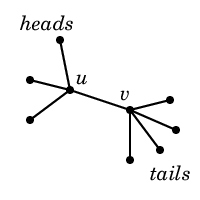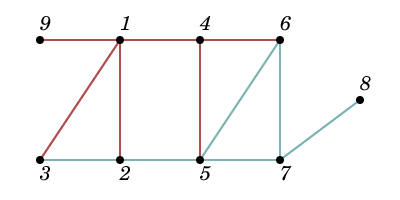CF243B.Hydra
普及/提高-
通过率:0%
AC君温馨提醒
该题目为【codeforces】题库的题目,您提交的代码将被提交至codeforces进行远程评测,并由ACGO抓取测评结果后进行展示。由于远程测评的测评机由其他平台提供,我们无法保证该服务的稳定性,若提交后无反应,请等待一段时间后再进行重试。
题目描述
One day Petya got a birthday present from his mom: a book called "The Legends and Myths of Graph Theory". From this book Petya learned about a hydra graph.
A non-oriented graph is a hydra, if it has a structure, shown on the figure below. Namely, there are two nodes u and v connected by an edge, they are the hydra's chest and stomach, correspondingly. The chest is connected with h nodes, which are the hydra's heads. The stomach is connected with t nodes, which are the hydra's tails. Note that the hydra is a tree, consisting of h+t+2 nodes.
 Also, Petya's got a non-directed graph G , consisting of n nodes and m edges. Petya got this graph as a last year birthday present from his mom. Graph G contains no self-loops or multiple edges.
Also, Petya's got a non-directed graph G , consisting of n nodes and m edges. Petya got this graph as a last year birthday present from his mom. Graph G contains no self-loops or multiple edges.
Now Petya wants to find a hydra in graph G . Or else, to make sure that the graph doesn't have a hydra.
输入格式
The first line contains four integers n , m , h , t ( 1<=n,m<=105 , 1<=h,t<=100 ) — the number of nodes and edges in graph G , and the number of a hydra's heads and tails.
Next m lines contain the description of the edges of graph G . The i -th of these lines contains two integers ai and bi ( 1<=ai,bi<=n , a=b ) — the numbers of the nodes, connected by the i -th edge.
It is guaranteed that graph G contains no self-loops and multiple edges. Consider the nodes of graph G numbered with integers from 1 to n .
输出格式
If graph G has no hydra, print "NO" (without the quotes).
Otherwise, in the first line print "YES" (without the quotes). In the second line print two integers — the numbers of nodes u and v . In the third line print h numbers — the numbers of the nodes that are the heads. In the fourth line print t numbers — the numbers of the nodes that are the tails. All printed numbers should be distinct.
If there are multiple possible answers, you are allowed to print any of them.
输入输出样例
输入#1
9 12 2 3 1 2 2 3 1 3 1 4 2 5 4 5 4 6 6 5 6 7 7 5 8 7 9 1
输出#1
YES 4 1 5 6 9 3 2
输入#2
7 10 3 3 1 2 2 3 1 3 1 4 2 5 4 5 4 6 6 5 6 7 7 5
输出#2
NO
说明/提示
The first sample is depicted on the picture below:
